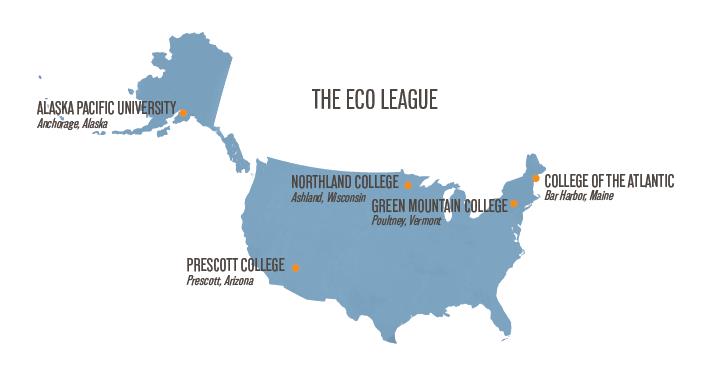
The Eco League consists of five member colleges across the United States including: Northland College in Ashland, WI (League Coordinating Body); Alaska Pacific University in Anchorage, AK; Prescott College in Prescott, AZ; Green Mountain College in Poultney, VT; and College of the Atlantic in Bar Harbor, ME. In November, 2013 Dickinson College, in Carlisle, PA joined the Eco League. This membership roster gives students access to learn about sustainability in three oceans, the Sonoran Desert, northern forests, glaciers, coastal islands, and on organic farms in four different growing regions.
Consortia are not new to the field of higher education, but the Eco League is unique in its unifying purpose. The goal of any consortium is to refine an educational experience for students around a particular field or discipline, combine practical and quality programming in such a way that each member of the consortium delivers a higher quality educational product for students, and reduce costs of duplication. Consortia allow students from each institution greater resources by “combining” faculty, staff, and facilities. For example, they may offer their students different courses and combined majors.
While most consortia in the United States revolve around a geographic proximity, the Eco League stands apart. Rather than proximity, the Eco League consortium is built around a mission of sustainability and educational values. With member colleges that span the North American continent from Alaska to the desert southwest and from the Midwest to the north Atlantic, we offer students who are interested in experiential environmental education opportunities to learn in diverse ecosystems and communities with faculty who have a wide range of expertise. We believe this diversity of education, location and field experiences are attractive to and important in preparing today’s college students to work in a global and interconnected world.
Over the past several years, students have moved easily from one campus to another during traditional and summer terms, taking advantage of coursework unique to each college and gaining educational credits toward his/her baccalaureate degrees while experiencing a different learning environment. Additionally, several faculty members have guest lectured at another campus or collaborated on projects. While not an Eco League partner, Hawaii Pacific University has signed a similar student exchange agreement with APU.
